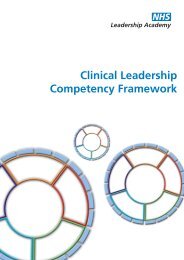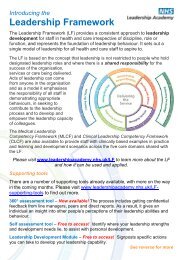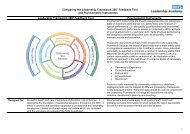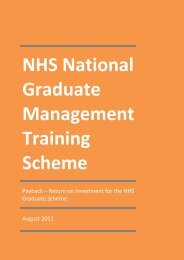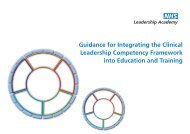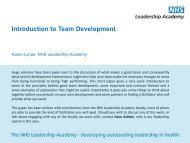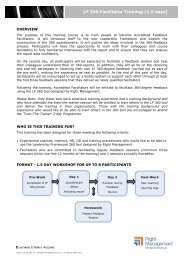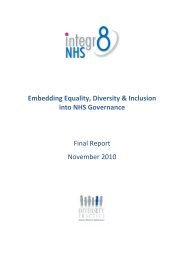Healthy NHS Board: a review of - NHS Leadership Academy
Healthy NHS Board: a review of - NHS Leadership Academy
Healthy NHS Board: a review of - NHS Leadership Academy
You also want an ePaper? Increase the reach of your titles
YUMPU automatically turns print PDFs into web optimized ePapers that Google loves.
2 Introduction<br />
2.1 Purpose and structure <strong>of</strong> the document<br />
This document has been written to support development<br />
<strong>of</strong> the updated guidance, The <strong>Healthy</strong> <strong>NHS</strong> <strong>Board</strong> 2013:<br />
Principles for Good Governance. It updates the <strong>review</strong> <strong>of</strong><br />
guidance and research evidence conducted in support<br />
<strong>of</strong> the original <strong>Healthy</strong> <strong>NHS</strong> <strong>Board</strong> (Ramsay et al., 2010).<br />
In drawing lessons from these information sources,<br />
we aim to ensure that the updated guidance reflects<br />
current recommendations on good governance and to<br />
provide an insight on the evidence supporting these<br />
recommendations.<br />
This <strong>review</strong> seeks to present lessons from research and<br />
guidance that have become available since the previous<br />
<strong>review</strong> was completed in early 2010: it therefore builds<br />
on the lessons <strong>of</strong> the previous <strong>review</strong>, but does not seek<br />
to repeat them. For a fuller picture <strong>of</strong> the evidence base,<br />
it is important that this document is read in conjunction<br />
with the original <strong>review</strong>.<br />
As with the main guidance, the scope <strong>of</strong> this <strong>review</strong> is<br />
to provide information <strong>of</strong> relevance to boards <strong>of</strong> <strong>NHS</strong><br />
provider organisations. Clinical Commissioning Groups<br />
have a significantly different governance structure, which<br />
means that certain sections <strong>of</strong> our <strong>review</strong> will not be<br />
relevant to boards <strong>of</strong> these organisations. However, the<br />
general principles <strong>of</strong> governance presented should be<br />
relevant to boards <strong>of</strong> all <strong>NHS</strong> organisations.<br />
We broadly retain the structure used in our original<br />
<strong>review</strong>. First, we present recent guidance and research<br />
evidence on the three board roles <strong>of</strong> formulating<br />
strategy, ensuring accountability and shaping culture.<br />
Second, we discuss some priorities that boards must<br />
address, including quality and safety, innovation,<br />
productivity, and equality and diversity. Third, we<br />
present evidence and guidance on the ‘building blocks<br />
<strong>of</strong> governance’: external context, local intelligence,<br />
and engagement <strong>of</strong> patients and the public, staff, and<br />
partner organisations, with a particular focus on recent<br />
lessons related to engagement. Fourth, we summarise<br />
recent learning in relation to specific board positions<br />
(Chair, CEO, and Executive and Non-Executive Directors)<br />
and board committees (including Audit, Remuneration,<br />
Nominations and Quality Committees).<br />
We then present evidence and guidance on building<br />
board effectiveness (previously ‘features <strong>of</strong> effective<br />
boards’) covering how size, composition, processes and<br />
the culture and dynamics <strong>of</strong> boards might influence<br />
their effectiveness; we also present a section on ‘people<br />
strategy’, where we describe how boards might make<br />
the most <strong>of</strong> the people in the workforce and the<br />
boardroom.<br />
This is a <strong>review</strong> <strong>of</strong> key guidance and research published<br />
since our original <strong>review</strong>, relating to board roles and<br />
priorities, and the building blocks <strong>of</strong> governance. It is<br />
not exhaustive. For example, in considering ‘people<br />
strategy’, we have focused on recent research and<br />
guidance relating to the healthcare sector only, as the<br />
wider human resource management literature was too<br />
rich to capture within the scope <strong>of</strong> the current <strong>review</strong>.<br />
The <strong>review</strong> has been guided by literature searches using<br />
such terms as ‘board governance’, ‘board governance<br />
+ quality’, and ‘board governance + engagement’ for<br />
the period beginning January 2010. It has also been<br />
informed by ongoing interaction with a steering group<br />
made up <strong>of</strong> experts in healthcare board governance.<br />
2.2 Developments since our original <strong>review</strong><br />
Table 1 summarises the guidance and research that<br />
we used in writing this <strong>review</strong>. For example, the report<br />
on the public inquiry into Mid Staffordshire <strong>NHS</strong><br />
Foundation Trust was published in February 2013:<br />
it makes recommendations on providing high quality,<br />
patient-centred care at every level <strong>of</strong> the English <strong>NHS</strong><br />
(Francis, 2013). In the corporate setting, the Financial<br />
Reporting Council published an updated code <strong>of</strong><br />
governance and guidance on board effectiveness<br />
(Financial Reporting Council, 2011, Financial Reporting<br />
Council, 2012). In terms <strong>of</strong> research, two significant<br />
<strong>review</strong>s have been carried out on board governance,<br />
effectiveness and development (Chambers et al., 2013,<br />
Alimo-Metcalfe, 2012).<br />
Readers may find Table 1 (overleaf) a useful reference<br />
point as they progress through this <strong>review</strong> for detail on<br />
the provenance <strong>of</strong> the information we present.<br />
www.leadershipacademy.nhs.uk 7



